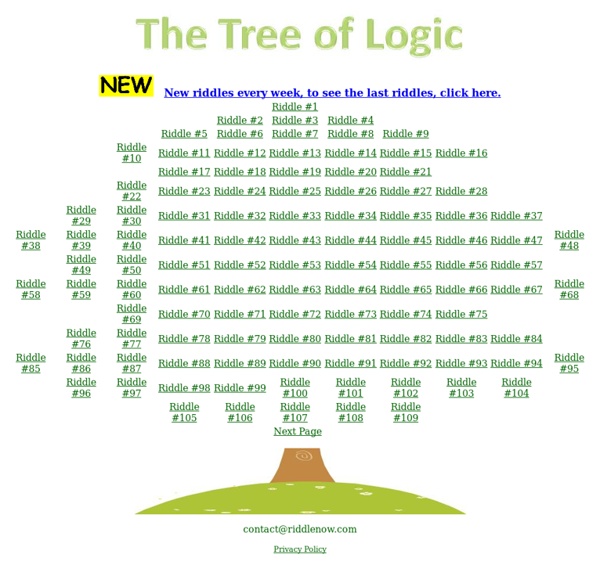



http://riddlenow.com/riddles.htm
Writers' forum - J K Rowling's Writing Process From this site Planning This is by far the most underrated of the steps in the writing process. And in the final wash up it is absolutely the most important. It was 1990 and Jo Rowling was on a train between Manchester and London. Harry literally strolled fully formed into her mind while she was gazing out the train window at a field full of cows.
Variable schedule of reinforcement — Limbicnutrition Weblog Ever wonder why those beaten and abused spouses stay with their abusers? Do you know why it is so hard to stop a gambling habit? It has to do with a bizarre trick of nature called variable reinforcement, and it can keep us trapped in behaviours for life. Schedules of ReinforcementThere is a popular misconception that if you start training a behavior by positive reinforcement, you will have to keep on using positive reinforcers for the rest of the subject’s natural life; if not, the behavior will disappear.
Rich Tasks As student needs became more apparent, teachers made precise and purposeful task selections. Sources for these tasks included professional journals and research articles, textbooks, resource books, as well as lessons co-planned by the team. Three main questions emerged related to the teaching and learning of fractions: Which representations support students in acquiring a deep understanding of fractions?When is accuracy in representations important?When should misconceptions be permitted to stand? The Seven Basic Plots Note: This page was cut for reason: Main redirect to work. [Malady] Creating red links in 0 articles. Ivan Pavlov Ivan Petrovich Pavlov (Russian: Ива́н Петро́вич Па́влов, IPA: [ɪˈvan pʲɪˈtrovʲɪt͡ɕ ˈpavləf] ( ); 26 September [O.S. 14 September] 1849 – 27 February 1936) was a Russian physiologist known primarily for his work in classical conditioning. From his childhood days Pavlov demonstrated intellectual brilliance along with an unusual energy which he named "the instinct for research".[1] Inspired by the progressive ideas which D. I. Pisarev, the most eminent of the Russian literary critics of the 1860s and I.
Thinking through mathematics: Engaging students with inquiry-based learning (Books 1-3) Introduction What is mathematical inquiry? Mathematical.inquiry.is.a.process.in.which.students.respond.to.ill-structured,.open-ended.questions.that.refect.the.authentic.problems.we.encounter.in.‘real’.lie.This.is.unlike.most.problems.we.teach.in.mathematics,.which.are.well-structured.and.close-ended.An.open-ended.ill-structured.question.has.no.single.correct.answer.It.contains.ambiguities.in.the.problem.or.in.the.process.o.solving.the.problem.that.require.students.to.make.a.number.o.decisions.This.means.that.the.emphasis.is.on.the.reasoning,.judgements.and.evidence.students.provide.rather.than.just.the.answer.(see.Developing.good.inquiry.questions.on.p.15)For.example,.rather.than.asking.students,.
Your Expertise is Worth Money: 5 Sites You Can Write For Plenty of people start blogging with the hope of making some money off their expertise. But it can be difficult to turn a profit on blogging: until you’ve built up a significant readership, you can expect only a few cents worth of Google AdSense revenue. There are certainly easier ways to earn money by writing about your area of expertise. There are plenty of sites that will pay for your short articles, although several have some drawbacks. The upfront payments are often pretty low, but many will pay you a portion of advertising revenues — and they get far more traffic than most blogs do.
Project for the New American Century The Project for the New American Century (PNAC) was an American think tank based in Washington, D.C. established in 1997 as a non-profit educational organization founded by William Kristol and Robert Kagan. The PNAC's stated goal is "to promote American global leadership."[1] Fundamental to the PNAC were the view that "American leadership is both good for America and good for the world" and support for "a Reaganite policy of military strength and moral clarity."[2] With its members in numerous key administrative positions, the PNAC exerted influence on high-level U.S. government officials in the administration of U.S. Annotated Bibliography Wordle Screen Shot. M.Curtin. 2013. In order to evaluate the relevancy of sources I utilised the CRAP test developed by Howard Rheingold. This resource has established a set of questions to apply to any source to help determine whether or not it is a reliable source of information.
25 Things You Should Know About Character Previous iterations of the “25 Things” series: 25 Things Every Writer Should Know 25 Things You Should Know About Storytelling And now… SCHOPENHAUER'S 38 STRATAGEMS, OR 38 WAYS TO WIN AN ARGUMENT Arthur Schopenhauer (1788-1860), was a brilliant German philosopher. These 38 Stratagems are excerpts from "The Art of Controversy", first translated into English and published in 1896. Carry your opponent's proposition beyond its natural limits; exaggerate it. The more general your opponent's statement becomes, the more objections you can find against it. The more restricted and narrow his or her propositions remain, the easier they are to defend by him or her. Use different meanings of your opponent's words to refute his or her argument.
‘Bobbie maths’ raising Pasifika achievement A revolution in maths achievement using a culturally-tailored approach developed at Massey University is attracting worldwide attention, and making a difference in the lives of South Auckland school children. Associate Professor Roberta (Bobbie) Hunter developed the inquiry-based approach aimed at raising maths achievement in low decile schools with predominantly Pasifika students for her PhD five years ago. These days she is in demand to share her teachings at home and worldwide, from Singapore and Hawa’ii to Canada and the United Kingdom. In her ‘communities of mathematical inquiry’ approach – dubbed ‘Bobbie maths’ – pupils work together to unravel a problem. And instead of defaulting to Westernised examples when applying mathematical concepts, they might refer to the weight of a taro, or dimensions of a tapa cloth. It’s about bringing in real world common sense to maths inquiry,” she says.